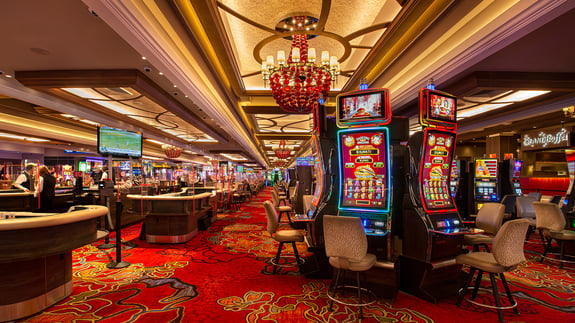Casino games have long been a fascinating entertainment option, drawing numerous of players from different cultures around the globe. From the opulent casinos of the Strip to the busy gambling halls of the Cotai Strip, these games serve as a bridge that connects people across various backgrounds. The allure of chance, strategy, and gambling entices not only those hoping to gamble for profit but also those in search of a feeling of belonging.
The influence of casino games extends well beyond the gaming floor. They often embody the social norms and beliefs of the cultures in which they flourish. Games such as poker, 21, and the wheel game have woven themselves into the tapestry of mainstream culture, influencing various aspects from films to clothing. As we explore this intriguing intersection of gambling and culture, we can gain insights into how these games shape and are shaped by the world around us.
Chronological Evolution of Gaming Games
The roots of casino games can be followed back to ancient cultures, where betting in various forms was extensively practiced. 78WIN1.DEV In China, around 2300 BC, a form of gambling known as Keno was well-known, while in historic the Roman Empire, soldiers would often bet on the consequences of their matches. The concept of using randomness for fun and income developed over the years, leading to the formation of more structured games. By the end of the Middle Ages, gambling houses initiated to appear in European nations, particularly in Italy, which presented early versions of popular games still practiced today.
As betting expanded popularity in Europe, the 17th and 18th centuries saw the emergence of casinos as exclusive establishments for betting. The first official gaming venue, the Ridotto, was set up in Venice in sixteen thirty-eight, featuring games like Baccarat games and Faro. This period marked a significant shifting point, as gaming venues commenced to welcome not just the elite but also the burgeoning middle-tier society. The complexity of games increased, leading to the development of new rules and variations that enriched the experience of players.
In the 19th century, the era of industrialization and shifts in societal norms further changed the environment of gaming activities. The introduction of roulette and contemporary one-armed bandits attracted a broader clientele, and casinos became seen as legitimate entertainment. This period witnessed the globalization of gaming, as casinos expanded from European nations to the New World, culminating in the establishment of the iconic Las Vegas Strip in the 20th century. The development of gaming games has persisted into the current era, incorporating modern technology and digital services, rendering them available to a global population.
### Cultural Significance within Diverse Societies
Casino activities have profound social importance in many societies around the globe. Places like Las Vegas, the very core of the city is woven around casinos, where playing is not just a recreational activity but a key aspect of social engagement and community interaction. The vivid lights and vibrant atmosphere attract millions, showcasing how gambling activities can influence local economies and cultural identities. This environment transforms the notion of relaxation into an immersive encounter that affects style, sound, and even film.
In contrast, some societies treat gambling with more caution, considering it through the lens of ethical considerations and customs. A case in point, in many Asian communities, games like Mahjong and Pai Gow Poker are full of history and have significant social meanings. These games are often played during meetings and celebrations, fostering community bonds and reinforcing familial ties. The act of participating in these games goes past mere entertainment, reflecting principles such as honoring elders and the value of communal fun.
At the same time, in European countries such as Monaco and the Italian Peninsula, casino games serve as symbols of luxury and elegance. The stylish atmosphere of these venues attracts both tourists and native inhabitants, maintaining a sense of prestige and rarity. The art of Texas Hold’em and the tactical components of games like banker’s game are appreciated, shaping interpersonal interactions and establishing an allure that fascinates a varied audience. This emphasizes how casino games can concurrently echo and shape cultural perspectives towards danger, gain, and relationship building.
Economic Impact and Tourism
Gambling activities play a crucial role in the financial context of many regions, particularly those that depend significantly on visitor traffic. The revenue generated from casino operations fuels local financial systems, creating jobs not only within the casinos but also but also in related sectors such as hospitality, restaurant services, and entertainment. This surge of tourists, drawn by the allure of gambling and the overall gaming environment, stimulates expenditure across multiple local enterprises, contributing to the economic health of the region.
The existence of casinos often leads to the construction of infrastructure, including lodging, public transit, and recreational facilities. These developments are essential in improving the overall tourist experience, making destinations more attractive to tourists. Additionally, many casinos invest in local communities through sponsorship of events and philanthropic initiatives, further integrating themselves into the social fabric of the locality. 78WIN01 Such investment not only supports economic growth but also cultivates a positive reputation of the gambling sector.
In addition, the worldwide appeal of casino games drives tourism competition, with locations vying to attract players from around the world. Iconic destinations like Las Vegas and Macau have become identifiable with casino culture, drawing millions annually. This competitive edge encourages creativity and diversification within the gaming industry, influencing developments in entertainment and hospitality that resonate beyond their limits. The consequences of this tourism extend wide, impacting local financial health and cultural exchanges on a global scale.
